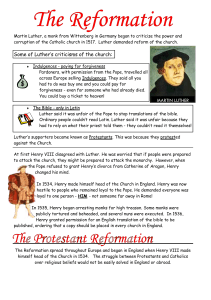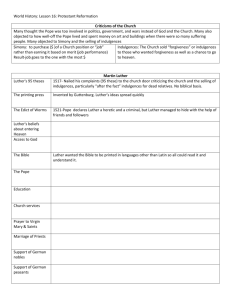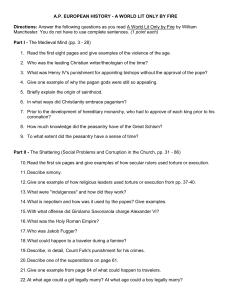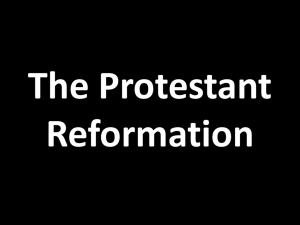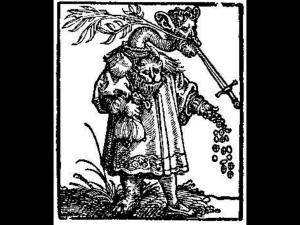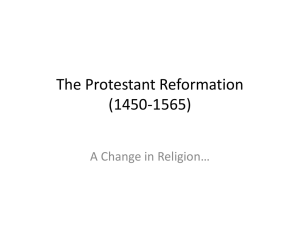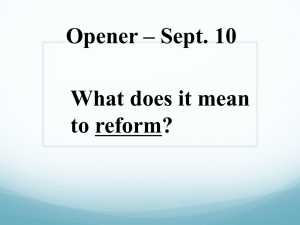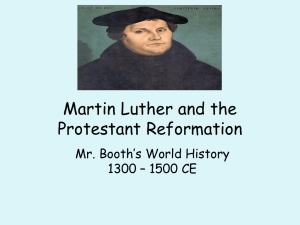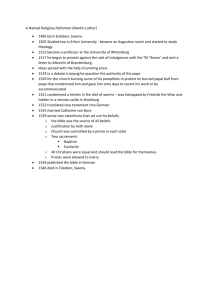Martin Luther
advertisement
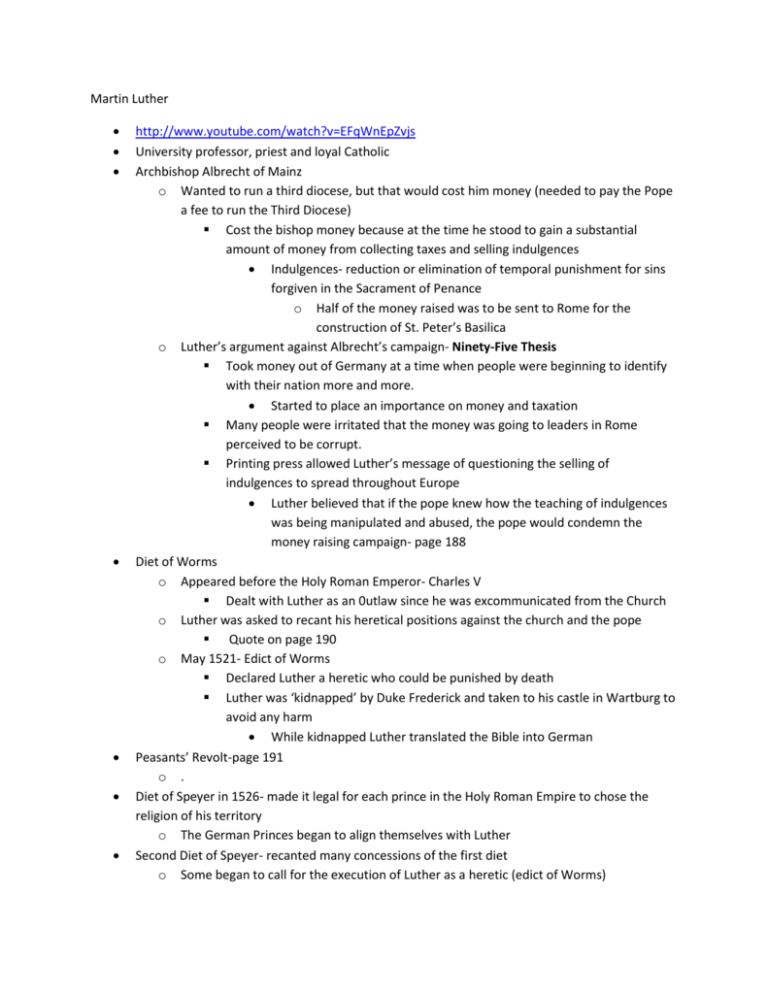
Martin Luther http://www.youtube.com/watch?v=EFqWnEpZvjs University professor, priest and loyal Catholic Archbishop Albrecht of Mainz o Wanted to run a third diocese, but that would cost him money (needed to pay the Pope a fee to run the Third Diocese) Cost the bishop money because at the time he stood to gain a substantial amount of money from collecting taxes and selling indulgences Indulgences- reduction or elimination of temporal punishment for sins forgiven in the Sacrament of Penance o Half of the money raised was to be sent to Rome for the construction of St. Peter’s Basilica o Luther’s argument against Albrecht’s campaign- Ninety-Five Thesis Took money out of Germany at a time when people were beginning to identify with their nation more and more. Started to place an importance on money and taxation Many people were irritated that the money was going to leaders in Rome perceived to be corrupt. Printing press allowed Luther’s message of questioning the selling of indulgences to spread throughout Europe Luther believed that if the pope knew how the teaching of indulgences was being manipulated and abused, the pope would condemn the money raising campaign- page 188 Diet of Worms o Appeared before the Holy Roman Emperor- Charles V Dealt with Luther as an 0utlaw since he was excommunicated from the Church o Luther was asked to recant his heretical positions against the church and the pope Quote on page 190 o May 1521- Edict of Worms Declared Luther a heretic who could be punished by death Luther was ‘kidnapped’ by Duke Frederick and taken to his castle in Wartburg to avoid any harm While kidnapped Luther translated the Bible into German Peasants’ Revolt-page 191 o . Diet of Speyer in 1526- made it legal for each prince in the Holy Roman Empire to chose the religion of his territory o The German Princes began to align themselves with Luther Second Diet of Speyer- recanted many concessions of the first diet o Some began to call for the execution of Luther as a heretic (edict of Worms) The German princes began to protest these decisions and gained the name Protestants Many non-Lutheran churches were called reform churches at the time Peace of Augsburg o The prince or king of each state could select either Catholicism or Lutheranism as the official religion of the territory o Forbade all other sects of Protestantism o Ordered all Catholic bishops to give up their land and property if the territory turned Lutheran o Known in Latin as cuius region, eius religio (region where you live determines your religion) Spread of Protestantism Reformation in France and Spain o Huguenots (oath comrades) French Protestants o Most French remained Catholic o Edict of Nantes Henry IV proclaimed that the Huguenots were allowed to build their own churches and hold services in specific French villages Goal was to end conflicts between the Catholics and Protestants King Henry VIII and the Anglican Church o Henry became King at 18 after his brother died. According to law, Henry was betrothed to his brother’s wife, Catherine of Aragon Henry at the time was a devoted Catholic and wrote a pamphlet in 1521 denouncing Martin Luther Henry and Catherine had many children but only 1 girl, Mary, loved pasted infancy o Mary was betrothed to the king of France If Henry did not have a male heir, when he died the king of France would then become king of England Henry petitioned for an annulment from Catherine so that he could attempt to have a make heir with another women o Petition was denied o In 1533, Henry called upon the English Parliament to declare that he was not responsible to any foreign power Established a break from the pope since Henry, by English law, could not be subject to the pope Henry’s main goal was simply to have his marriage annulled. He wanted to keep church practices and structures the same, just not under the power of the pope o Henry took over the monasteries, closed them and gave the land to his most faithful supporters Under Elizabeth I, the Church of England moved to become more Protestant One group wanted to “purify” the country of all Catholic trappings Puritanism was fundamentally anti-Catholic: Puritans felt that the Church of England was still too close to Catholicism and needed to be reformed further. Many of the rituals preserved by the Church of England were not only considered to be objectionable, but were believed by some nonconformists to put one's immortal soul in peril This group is eventually pushed out of England and came to America as the Puritans
